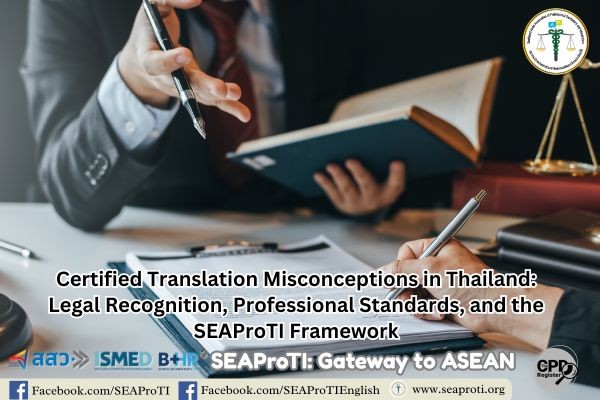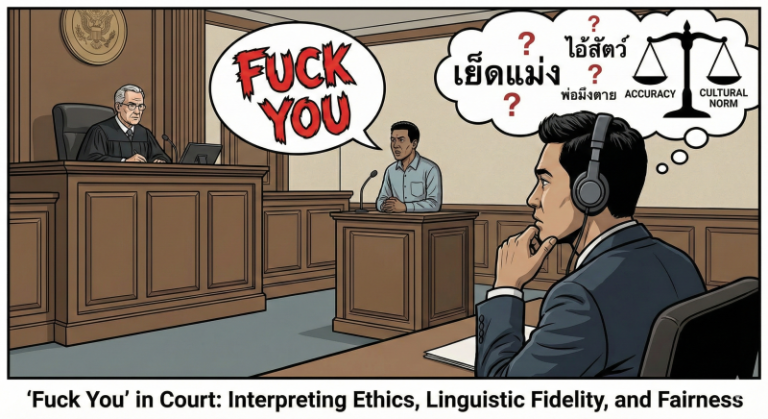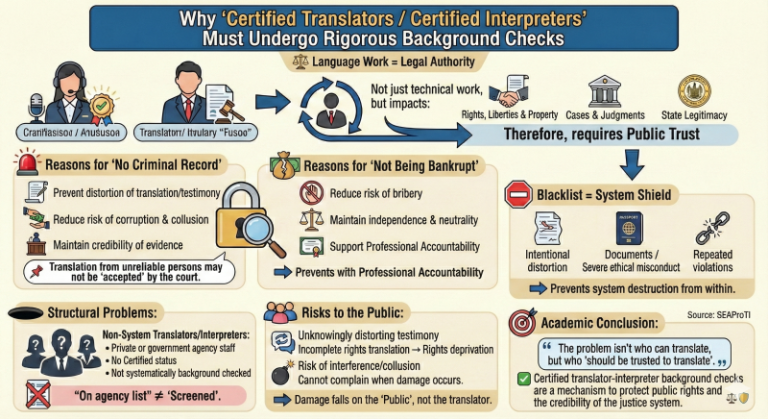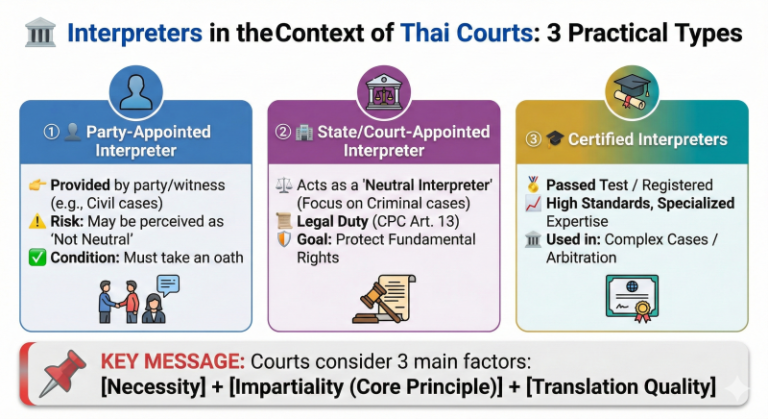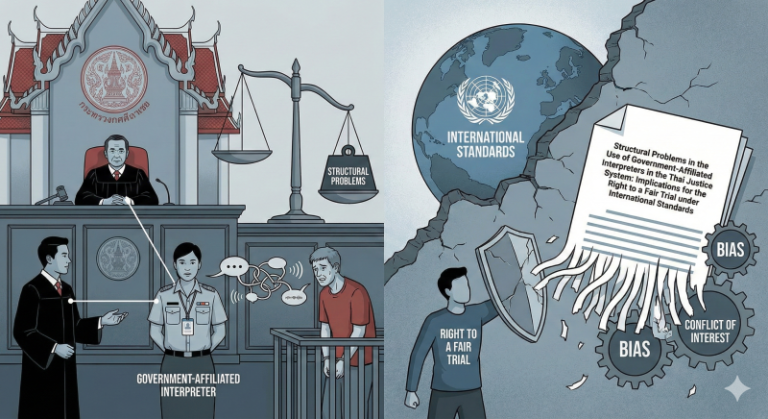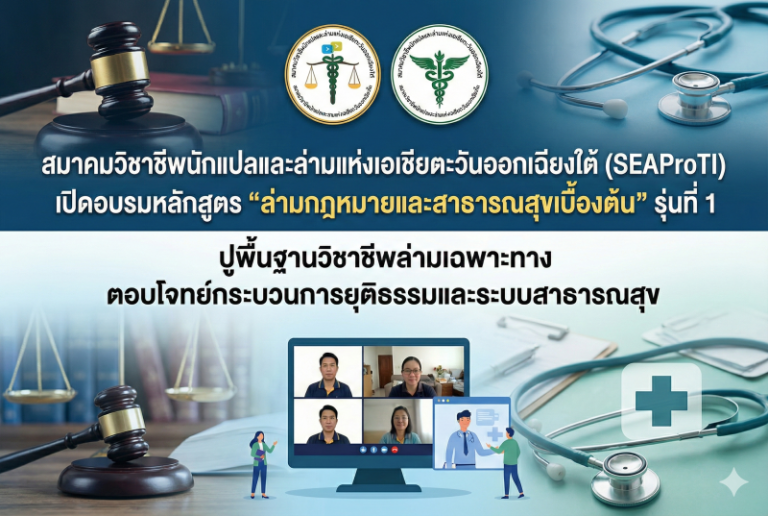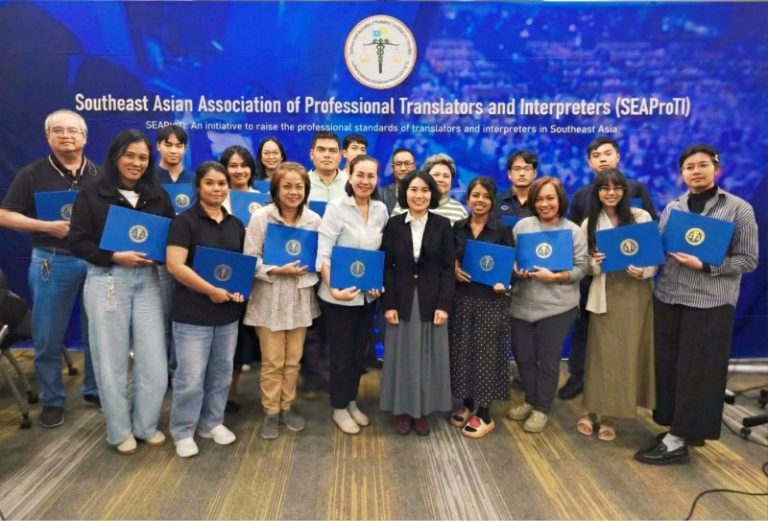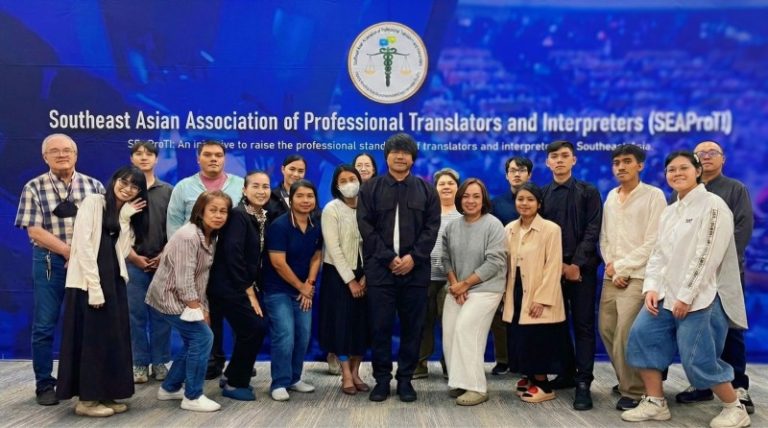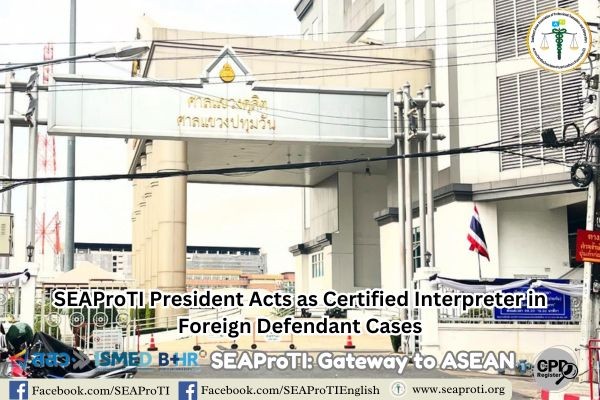Certified Translation Misconceptions in Thailand:
Legal Recognition, Professional Standards, and the SEAProTI Framework
19 October 2025, Bangkok – The misuse of the term certified translation in Thailand has led to significant confusion among clients, agencies, and even public institutions. This article clarifies the legal meaning of certified translation, emphasizing that only translators certified by the Southeast Asian Association of Professional Translators and Interpreters (SEAProTI) are legally and professionally authorized to issue certified translations under Thai law. The study draws upon the Royal Gazette publication (2024) and the Council of State’s letter (2025) proposing the formal recognition of registered translators and certified translation providers.
1. Introduction
In recent years, Thailand’s translation industry has seen an increasing number of individuals and agencies claiming to provide certified translations. However, most of these operators are neither registered nor qualified under any legally recognized framework. The misuse of this term not only misleads consumers but also undermines public trust in official documents and legal proceedings. To address this problem, the Southeast Asian Association of Professional Translators and Interpreters (SEAProTI) has established a comprehensive certification framework recognized by the Thai government.
2. Legal Recognition of Certified Translators in Thailand
Certified translation in Thailand is defined under the Articles of Association of SEAProTI, which were formally published in the Royal Gazette on 25 July 2024 (Vol. 141, Part 66 Ng, p. 100). This government publication—issued through the Secretariat of the Cabinet, Office of the Prime Minister—formally acknowledges SEAProTI’s role as a professional authority responsible for establishing qualification standards and registration procedures for:
- Certified Translators (CT)
- Translation Certification Providers (TCP)
- Certified Interpreters (CI)
This recognition confirms that the authority to issue certified translations is not open to public assumption but is restricted to registered professionals under SEAProTI or accredited institutions recognized by the Thai government.
3. The Council of State’s Position and Proposed Royal Decree
Further strengthening this legal foundation, the Council of State of Thailand issued a formal letter to SEAProTI on 28 April 2025, proposing the enactment of a Royal Decree that would officially authorize registered translators and recognized translation certifiers from accredited language institutions to provide legally valid translation certification.
This policy aims to prevent unqualified individuals from producing translations that could compromise the accuracy, reliability, and admissibility of official documents in administrative, judicial, or international contexts.
4. Misuse and Misconceptions in the Thai Translation Market
Despite these developments, many freelance translators and commercial agencies continue to advertise “certified translation” services without legitimate credentials. Such practices are misleading and may constitute violations of Thailand’s consumer protection laws.
Common forms of malpractice include:
- Using counterfeit or self-styled “certified translator” stamps or seals.
- Misrepresenting affiliation with ministries or embassies.
- Submitting uncertified translations to official bodies results in document rejection.
These fraudulent practices erode trust in the translation profession and expose clients to legal risks, especially in cases involving immigration, litigation, or business contracts.
5. Professional Standards Under SEAProTI
SEAProTI certification is founded on peer-reviewed professional assessment, ethical accountability, and continuing education. To qualify, candidates must:
- Pass technical translation examinations aligned with international standards (AIIC, CIOL, NAATI, ATA).
- Commit to SEAProTI’s Code of Professional Conduct and Ethics.
- Participate in ongoing Continuing Professional Development (CPD) to maintain registration.
- Accept peer oversight from the Credential Committee and Ethics Committee.
These standards ensure that certified translations meet evidentiary and procedural requirements consistent with global best practices.
6. Implications for Policy and Public Awareness
The Thai public, legal institutions, and private entities must be educated to distinguish between certified translations and ordinary translations. Regulatory enforcement should prohibit individuals and businesses from misusing the term “certified” without proper accreditation.
Moreover, collaboration between SEAProTI and governmental agencies should continue to ensure that certified translators are recognized as a regulated professional group—analogous to lawyers, notaries, and sworn interpreters in other jurisdictions.
7. Conclusion
“Certified translation” in Thailand is not a marketing term but a legally defined professional act that carries evidentiary value. The SEAProTI framework, as published in the Royal Gazette and endorsed by the Council of State, sets the benchmark for professional competence, ethics, and accountability. Non-certified translators who claim to provide certified translations are engaging in misrepresentation and, in many cases, professional fraud.
Moving forward, greater public awareness, government regulation, and enforcement of certification standards will be essential to protect consumers, uphold justice, and professionalize Thailand’s language industry.
References
- Council of State of Thailand. (2025, April 28). Letter to SEAProTI regarding the proposed Royal Decree on Registered Translators and Recognized Translation Certifiers. Office of the Prime Minister, Bangkok.
- Southeast Asian Association of Professional Translators and Interpreters (SEAProTI). (2024, July 25). Articles of Association and Certification Requirements for Translators and Interpreters. Royal Gazette, Vol. 141, Part 66 Ng, p. 100.
- Southeast Asian Association of Professional Translators and Interpreters (SEAProTI). (2025). Code of Professional Conduct and Ethics. Bangkok: SEAProTI Secretariat.
About Certified Translators, Translation Certifiers, and Certified Interpreters of SEAProTI
The Southeast Asian Association of Professional Translators and Interpreters (SEAProTI) has formally announced the qualifications and requirements for registration of Certified Translators, Translation Certification Providers, and Certified Interpreters in Sections 9 and 10 of the Royal Gazette, published by the Secretariat of the Cabinet, Office of the Prime Minister of Thailand, on 25 July 2024 (Vol. 141, Part 66 Ng, p. 100). Certified Translators, Translation Certification Providers, and Certified Interpreters
The Council of State has proposed the enactment of a Royal Decree, granting registered translators and recognized translation certifiers from professional associations or accredited language institutions the authority to provide legally valid translation certification (Letter to SEAProTI dated April 28, 2025)
SEAProTI is the first professional association in Thailand and Southeast Asia to implement a comprehensive certification system for translators, certifiers, and interpreters.
Head Office: Baan Ratchakru Building, No. 33, Room 402, Soi Phahonyothin 5, Phahonyothin Road, Phaya Thai District, Bangkok 10400, Thailand
Email: hello@seaproti.com | Tel.: (+66) 2-114-3128 (Office hours: Mon–Fri, 09:00–17:00)
ความเข้าใจผิดเกี่ยวกับ “การแปลรับรอง” ในประเทศไทย:
ฐานะทางกฎหมาย มาตรฐานวิชาชีพ และกรอบการรับรองของ SEAProTI
19 ตุลาคม 2568, กรุงเทพมหานคร – คำว่า “การแปลรับรอง” (Certified Translation) ในประเทศไทยมักถูกใช้ผิดโดยผู้ประกอบการที่ไม่มีคุณสมบัติทางวิชาชีพ ซึ่งก่อให้เกิดความเข้าใจผิดในหมู่ผู้ใช้บริการ หน่วยงานรัฐ และองค์กรเอกชน บทความนี้อธิบายความหมายทางกฎหมายของการแปลรับรอง โดยชี้ให้เห็นว่าผู้ที่มีสิทธิรับรองการแปลอย่างถูกต้องตามกฎหมายจะต้องเป็น “นักแปลที่ได้รับการรับรองจากสมาคมวิชาชีพนักแปลและล่ามแห่งเอเชียตะวันออกเฉียงใต้ (SEAProTI)” เท่านั้น ทั้งนี้อ้างอิงตามประกาศในราชกิจจานุเบกษา (พ.ศ. 2567) และหนังสือของคณะกรรมการกฤษฎีกา (พ.ศ. 2568) ซึ่งเสนอให้ตราพระราชกฤษฎีกาเพื่อรับรองสถานะของนักแปลที่ขึ้นทะเบียนอย่างเป็นทางการ
1. บทนำ
ในช่วงไม่กี่ปีที่ผ่านมา วงการแปลในประเทศไทยมีผู้ให้บริการจำนวนมากที่อ้างตนว่าให้บริการ “การแปลรับรอง” โดยไม่มีการขึ้นทะเบียนหรือได้รับการรับรองจากองค์กรวิชาชีพใด ๆ การใช้คำนี้ในเชิงพาณิชย์อย่างผิด ๆ ไม่เพียงเป็นการหลอกลวงผู้บริโภค แต่ยังส่งผลกระทบต่อความน่าเชื่อถือของเอกสารทางราชการและกระบวนการยุติธรรม เพื่อแก้ไขปัญหานี้ SEAProTI ได้จัดตั้งระบบการรับรองอย่างเป็นทางการ ซึ่งได้รับการประกาศรับรองโดยรัฐบาลไทย
2. การรับรองทางกฎหมายของนักแปลในประเทศไทย
คำว่า “นักแปลรับรอง” (Certified Translator) ถูกนิยามและกำหนดคุณสมบัติไว้ในข้อบังคับของสมาคม SEAProTI ซึ่งได้รับการประกาศใน ราชกิจจานุเบกษา เมื่อวันที่ 25 กรกฎาคม พ.ศ. 2567 (เล่ม 141 ตอน 66 ง หน้า 100) โดยสำนักเลขาธิการคณะรัฐมนตรี สำนักนายกรัฐมนตรี การประกาศนี้ได้ให้การยอมรับอย่างเป็นทางการว่า SEAProTI เป็นองค์กรวิชาชีพที่มีอำนาจในการกำหนดคุณสมบัติและกระบวนการขึ้นทะเบียนสำหรับบุคคลใน 3 ประเภท ได้แก่
- นักแปลที่ได้รับการรับรอง (Certified Translators: CT)
- ผู้ให้บริการรับรองการแปล (Translation Certification Providers: TCP)
- ล่ามที่ได้รับการรับรอง (Certified Interpreters: CI)
การประกาศดังกล่าวแสดงให้เห็นชัดเจนว่า การรับรองการแปลเป็นการกระทำทางวิชาชีพที่ต้องอาศัยอำนาจตามกฎหมาย ไม่ใช่สิ่งที่บุคคลทั่วไปสามารถอ้างสิทธิ์ได้
3. หนังสือจากคณะกรรมการกฤษฎีกาและร่างพระราชกฤษฎีกา
เพื่อเสริมสร้างความชัดเจนทางกฎหมาย คณะกรรมการกฤษฎีกาแห่งประเทศไทย ได้มีหนังสือถึง SEAProTI ลงวันที่ 28 เมษายน พ.ศ. 2568 เสนอให้ตรา พระราชกฤษฎีกาว่าด้วยนักแปลที่ขึ้นทะเบียนและผู้รับรองการแปลที่ได้รับการรับรอง เพื่อให้นักแปลที่ผ่านการขึ้นทะเบียนจากองค์กรวิชาชีพหรือสถาบันภาษาที่ได้รับการรับรอง มีอำนาจตามกฎหมายในการรับรองเอกสารการแปลได้อย่างสมบูรณ์
แนวทางนี้มีวัตถุประสงค์เพื่อป้องกันมิให้บุคคลที่ไม่มีคุณสมบัติทางวิชาชีพออกเอกสารแปลที่อาจผิดพลาดหรือขัดต่อความถูกต้องของเอกสารทางราชการ ซึ่งอาจก่อให้เกิดผลเสียหายต่อกระบวนการยุติธรรมและความสัมพันธ์ระหว่างประเทศ
4. การใช้คำว่า “การแปลรับรอง” อย่างผิดและความเข้าใจที่คลาดเคลื่อน
แม้มีกรอบทางกฎหมายที่ชัดเจนแล้ว แต่ในตลาดการแปลของไทยยังพบว่ามีผู้ประกอบการและนักแปลอิสระจำนวนมากที่โฆษณาบริการ “แปลรับรอง” โดยไม่มีคุณสมบัติหรือการขึ้นทะเบียนตามกฎหมาย การกระทำเช่นนี้เป็นการหลอกลวงผู้บริโภค และอาจเข้าข่ายละเมิด พระราชบัญญัติคุ้มครองผู้บริโภค พ.ศ. 2522
รูปแบบที่พบบ่อย ได้แก่
- การใช้ตราประทับหรือเครื่องหมาย “Certified Translator” ที่ปลอมแปลงหรือผลิตขึ้นเอง
- การอ้างชื่อกระทรวงหรือสถานทูตโดยไม่ได้รับอนุญาต
- การส่งเอกสารแปลที่ไม่มีการรับรองอย่างถูกต้องไปยังหน่วยงานรัฐ ซึ่งมักถูกปฏิเสธไม่รับรอง
พฤติกรรมเหล่านี้บ่อนทำลายความน่าเชื่อถือของวิชาชีพนักแปล และสร้างความเสียหายแก่ผู้ใช้บริการทั้งในด้านกฎหมายและเศรษฐกิจ
5. มาตรฐานวิชาชีพตามกรอบของ SEAProTI
ระบบการรับรองของ SEAProTI ตั้งอยู่บนหลักการของ การประเมินโดยผู้ทรงคุณวุฒิ (Peer Review), จรรยาบรรณทางวิชาชีพ (Professional Ethics) และ การพัฒนาวิชาชีพต่อเนื่อง (Continuing Professional Development – CPD) ผู้สมัครต้องผ่านกระบวนการที่เข้มงวด ได้แก่
- การสอบวัดผลการแปลตามมาตรฐานสากล (เช่น AIIC, CIOL, NAATI, ATA)
- การยอมรับและปฏิบัติตาม “ประมวลจรรยาบรรณทางวิชาชีพของ SEAProTI”
- การต่ออายุการรับรองทุกปีโดยผ่านการอบรมและพัฒนาอย่างต่อเนื่อง
- การอยู่ภายใต้การกำกับดูแลของคณะกรรมการคุณวุฒิและคณะกรรมการจรรยาบรรณ
มาตรฐานเหล่านี้ทำให้การแปลรับรองจาก SEAProTI มีน้ำหนักทางกฎหมายและเป็นที่ยอมรับในระดับนานาชาติ
6. ผลกระทบต่อการกำหนดนโยบายและการสร้างความตระหนักแก่สาธารณะ
ภาครัฐ ภาคเอกชน และประชาชนทั่วไป จำเป็นต้องเข้าใจความแตกต่างระหว่าง “การแปลทั่วไป” กับ “การแปลรับรอง” อย่างถูกต้อง หน่วยงานที่เกี่ยวข้องควรออกมาตรการกำกับดูแลการโฆษณาและการใช้คำว่า “Certified Translator” เพื่อป้องกันการหลอกลวงทางวิชาชีพ
นอกจากนี้ รัฐบาลควรประสานความร่วมมือกับ SEAProTI ในการจัดทำทะเบียนกลางนักแปลและล่ามวิชาชีพ เพื่อยกระดับสถานะของนักแปลให้เป็น “วิชาชีพที่มีการกำกับดูแล” เช่นเดียวกับทนายความหรือทนายโนตารีในต่างประเทศ
7. สรุป
“การแปลรับรอง” ในประเทศไทยไม่ใช่คำทางการตลาด แต่เป็นการกระทำทางวิชาชีพที่มีผลทางกฎหมาย เอกสารที่ได้รับการรับรองจากนักแปลที่ผ่านการรับรองของ SEAProTI เท่านั้น จึงจะมีสถานะถูกต้องตามมาตรฐานวิชาชีพและสามารถใช้ยื่นต่อหน่วยงานราชการ ศาล หรือสถานทูตได้
นักแปลที่ไม่ได้รับการรับรองแต่แอบอ้างว่าให้บริการแปลรับรอง ถือเป็นการกระทำที่บิดเบือนความจริงและอาจเข้าข่ายฉ้อโกง การสร้างความตระหนักรู้ของสังคม ควบคู่กับการบังคับใช้กฎหมายและมาตรฐานวิชาชีพอย่างเข้มแข็ง จะเป็นกุญแจสำคัญในการปกป้องผู้บริโภคและยกระดับวิชาชีพการแปลของไทยให้เทียบเท่าสากล
บรรณานุกรม
- คณะกรรมการกฤษฎีกาแห่งประเทศไทย. (2568, 28 เมษายน). หนังสือถึงสมาคม SEAProTI เรื่องการเสนอร่างพระราชกฤษฎีกาว่าด้วยนักแปลที่ขึ้นทะเบียนและผู้รับรองการแปลที่ได้รับการรับรอง. สำนักนายกรัฐมนตรี, กรุงเทพฯ.
- สมาคมวิชาชีพนักแปลและล่ามแห่งเอเชียตะวันออกเฉียงใต้ (SEAProTI). (2567, 25 กรกฎาคม). ข้อบังคับและคุณสมบัติของผู้ขอขึ้นทะเบียนนักแปลและล่ามรับรอง. ราชกิจจานุเบกษา, เล่ม 141 ตอน 66 ง หน้า 100.
- สมาคมวิชาชีพนักแปลและล่ามแห่งเอเชียตะวันออกเฉียงใต้ (SEAProTI). (2568). ประมวลจรรยาบรรณทางวิชาชีพของนักแปลและล่าม. กรุงเทพฯ: สำนักงานเลขานุการสมาคม SEAProTI.
เกี่ยวกับนักแปลรับรอง ผู้รับรองการแปล และล่ามรับรองของสมาคมวิชาชีพนักแปลและล่ามแห่งเอเชียตะวันออกเฉียงใต้
สมาคมวิชาชีพนักแปลและล่ามแห่งเอเชียตะวันออกเฉียงใต้ (SEAProTI) ได้ประกาศหลักเกณฑ์และคุณสมบัติผู้ที่ขึ้นทะเบียนเป็น “นักแปลรับรอง (Certified Translators) และผู้รับรองการแปล (Translation Certification Providers) และล่ามรับรอง (Certified Interpreters)” ของสมาคม หมวดที่ 9 และหมวดที่ 10 ในราชกิจจานุเบกษา ของสำนักเลขาธิการคณะรัฐมนตรี ในสำนักนายกรัฐมนตรี แห่งราชอาณาจักรไทย ลงวันที่ 25 ก.ค. 2567 เล่มที่ 141 ตอนที่ 66 ง หน้า 100 อ่านฉบับเต็มได้ที่: นักแปลรับรอง ผู้รับรองการแปล และล่ามรับรอง
สำนักคณะกรรมการกฤษฎีกาเสนอให้ตราเป็นพระราชกฤษฎีกา โดยกำหนดให้นักแปลที่ขึ้นทะเบียน รวมถึงผู้รับรองการแปลจากสมาคมวิชาชีพหรือสถาบันสอนภาษาที่มีการอบรมและขึ้นทะเบียน สามารถรับรองคำแปลได้ (จดหมายถึงสมาคม SEAProTI ลงวันที่ 28 เม.ย. 2568)
สมาคมวิชาชีพนักแปลและล่ามแห่งเอเชียตะวันออกเฉียงใต้ เป็นสมาคมวิชาชีพแห่งแรกในประเทศไทยและภูมิภาคเอเชียตะวันออกเฉียงใต้ที่มีระบบรับรองนักแปลรับรอง ผู้รับรองการแปล และล่ามรับรอง
สำนักงานใหญ่: อาคารบ้านราชครู เลขที่ 33 ห้อง 402 ซอยพหลโยธิน 5 ถนนพหลโยธิน แขวงพญาไท เขตพญาไท กรุงเทพมหานคร 10400 ประเทศไทย
อีเมล: hello@seaproti.com โทรศัพท์: (+66) 2-114-3128 (เวลาทำการ: วันจันทร์–วันศุกร์ เวลา 09.00–17.00 น.)


